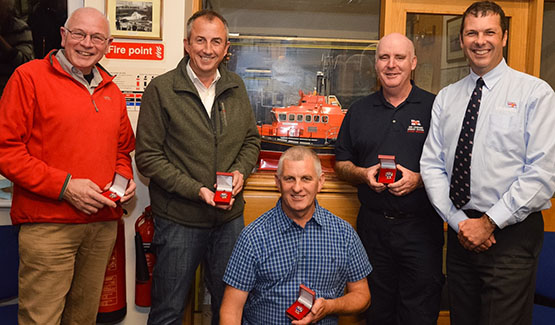Four volunteer crew members at Dun Laoghaire RNLI have been recognised this week for their commitment to the charity that saves lives at sea.
Kieran O’Connell, Eamon O’Leary, Stuart Kane and David Branigan have collectively provided 120 years’ service to the RNLI. The four who continue to volunteer their time as crew, were presented with a Bar to Long Service badge in Dun Laoghaire last night.
Kieran O’Connell who is also station mechanic, started as a volunteer crew member at Youghal RNLI in County Cork in 1983 where he served both on the all-weather and Atlantic 75 inshore lifeboats. He became station mechanic in 1995 and later accepted the same full-time position in Dun Laoghaire in 1998 moving with his wife Mary and their two daughters. When not on call, Colley is a keen drummer and also has an active interest in his former occupation as a fisherman.
Eamon O’Leary was one of the first volunteer recruits at Dun Laoghaire RNLI when the original D class inshore lifeboat was placed on station in August 1985 on a trial basis before becoming fully operational on St Patrick’s Day 1986. He later became a crew member on the Waveney class all-weather lifeboat, the John F Kennedy and more recently was appointed Second Coxswain on the current all-weather lifeboat the Anna Livia. A fire officer by occupation at Dublin Airport, Eamon who is married to Mary, received a ‘Person of the Year’ award in 1990 for a rescue on Killiney Bay.
Stuart Kane was another of the 1985 recruits who served both on the inshore and all-weather lifeboats before the arrival of the Trent class all-weather lifeboat in 1995. He was a senior helm on the inshore lifeboat for several years before becoming second mechanic and more recently Deputy Second Coxswain on the all-weather lifeboat. Stuart is married to Sharon, a former crew member who joined Dun Laoghaire RNLI in 1985 also. Their son Craig is now a crew member, continuing three generations of lifeboat tradition in their family.
David Branigan is the last of the 1985 recruits who joined in August that year. David initially served on the inshore lifeboat including a period as a senior helm and later joining the all-weather lifeboat when the Anna Livia arrived in 1995. Like all RNLI volunteers, David attended the RNLI College in Poole and was appointed Deputy Second Coxswain on the all-weather lifeboat. A professional photographer and journalist, he is also the station’s lifeboat press officer. Married to Jennifer, they are expecting their first child next month.
Since 1985, lifeboats at Dun Laoghaire RNLI have launched 1,360 times with crews saving 157 lives and rescuing 1,151 more.
Speaking after presenting the four long service badges, Owen Medland, RNLI Divisional Operations Manager, said: ‘Most lifeboat crew members are volunteers who come from all walks of life and give up their time and comfort to save lives at sea. David, Stuart, Eamon and Collie respond at a moment’s notice when their pagers go off. They are regularly called away from their families, their beds and their work, any time of the day, any day in the year. In addition, over the last 30 years, they each have invested several hours to train and upskill. Their lifesaving work is essential, often difficult and sometimes dangerous but they each do it selflessly, with courage, bravery and dedication, and on behalf of the RNLI, I would like to thank them for that.’































































